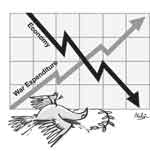| The Sunday Times Economic Analysis By the Economist | ||||
| |
||||
|
Crippling burden of financing a war
The deteriorating security situation has left the government with no option but to prepare for war. The truce in the last three years gave governments a respite in the procurement of military hardware, though recurrent expenditure continued to be high. That appears to have come to an end. Current preparations for war could be very costly and comes at a time when escalating oil prices are a severe strain and expenditure for war could be crippling. It is generally believed that the LTTE enhanced their armed capability over these years, while the government was quite lax and complacent, investing less in military hardware, preferring to give peace a greater chance.
This financial respite has not only come to an end but the current situation requires substantial catch-up expenditure on arms. Although the army as well as the government have repeatedly said that they have not been weakened and could meet the threat of war, the need for additional military hardware is undeniable. There is evidence that the government is currently making efforts to acquire military hardware. While the required extent of military expenditure is unclear, there is no doubt that it would be high. On a previous occasion when the government acquired additional military hardware it amounted to as much an increase in military expenditure as US$ 800. Public expenditure of this magnitude could create havoc in public finances and create a further dent in the already high trade deficit. The budget deficit is likely to rise to double-digit proportions and the trade deficit could reach a mammoth US$ 3 billion. How well the government manages this increase in expenditure could be vital for future economic growth. High military expenditure has been a core cause for fiscal instability both directly and indirectly. Directly military expenditure accounts for 19 percent of public expenditure. This percentage is higher than for either education or health. The impact of military expenditure has been insidious and cumulative. It has also been an important cause for the large current deficit in the budget which in turn creates an accumulation of public debt the strain of which arises in the form of servicing that debt. Last year, the public debt as a proportion of GDP amounted to 94 percent. More important, the servicing of this debt amounted to 27 percent of public expenditure. The magnitude of debt servicing is such that it too in turn results in increasing the budget deficit and thereby adds to servicing costs each year. This snowballing effect will continue to grow with additional military expenditure. So the country is trapped in a vicious cycle and the current increase in expenditure will tighten this trap further, adding to the economic and financial difficulties due to the current escalating costs of oil imports. Last year the country spent US$ 1655 million on fuel imports. This year the chances are that there could be a further increase owing to the continuous rise in oil prices. There are hardly any predictions of a scaling down of oil prices for the rest of the year. Tensions in the Middle East in Iran and Israel are sending prices even higher than the trend increase owing to declining oil resources. Some difficult economic decisions would need to be taken. Since military expenditure is considered mandatory, there has to be some commensurate decreases in other public expenditures. Certainly there cannot be extravagant exercises as of last year, when public sector employment was increased and salaries too raised. There may have to be pruning of welfare expenditures as well. The increase in salaries of parliamentarians is outrageous in this context. A more vigilant collection of both direct and indirect taxes would help. The increase in revenue collection last year is a hopeful sign and redoubling of efforts to raise government revenue to around 18 per cent of GDP could help much in reducing the current account deficit and reducing inflationary pressures. The trade deficit could grow to serious proportions and strain the balance of payments. Last year's fortuitous circumstances may not be repeated this year. Unfortunately military expenditure tends to be non-transparent and unaccountable. Even the weak systems of public accountability of funds in the country tend to be by-passed on the grounds of security reasons. The huge expenditure incurred tends to breed corruption as past experience has shown. Such corruption not only increases the costs but also reduces the efficiency of the war effort and the morale of those who are aware of the corruption in their own ranks. International assistance would be needed to relieve the financial burden at least temporarily. However, it hardly seems forthcoming from many of our “friendly” countries that say they are supportive of the country's territorial integrity.Support has tended to be in words rather than in substantial ways to crush terrorism. Despite their rhetoric to the contrary, they have a vested interest in the war and benefit by the escalation of our military expenditure that are important exports for them. Nevertheless there is a need to get deferred payment terms, loans and other financial assistance to meet the additional military expenditure. This is not a solution to the problem but a mere deferment of it for future years. If we must wage this expensive war, then let it be short and swift. The dragging of the war would indeed cripple the economy. |
||||
Copyright © 2006 Wijeya Newspapers Ltd. All rights reserved. |
